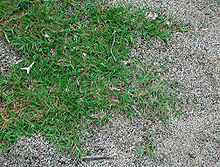| Bermuda grass | |
|---|---|

| |
| Cynodon dactylon | |
| Scientific classification | |
| Kingdom: | Plantae |
| Clade: | Tracheophytes |
| Clade: | Angiosperms |
| Clade: | Monocots |
| Clade: | Commelinids |
| Order: | Poales |
| Family: | Poaceae |
| Subfamily: | Chloridoideae |
| Tribe: | Cynodonteae |
| Subtribe: | Eleusininae |
| Genus: | Cynodon Rich. in Pers. 1805, not Brid. 1819 (a moss in family Ditrichaceae) |
| Type species | |
| Cynodon dactylon | |
| Synonyms[1] | |
| |
Cynodon is a genus of plants in the grass family.[2] It is native to warm temperate to tropical regions of the Old World, as well as being cultivated and naturalized in the New World and on many oceanic islands.
The genus name comes from Greek words meaning "dog-tooth". The genus as a whole as well as its species are commonly known as Bermuda grass or dog's tooth grass.
- Cynodon aethiopicus - Africa; introduced in South Africa, Queensland, Hawaii, Texas
- Cynodon barberi - India, Sri Lanka
- Cynodon coursii - Madagascar
- Cynodon dactylon - Old World; introduced in New World and on various islands
- Cynodon incompletus - southern Africa; introduced in Australia, Argentina
- Cynodon × magennisii - Limpopo, Gauteng, Mpumalanga; introduced in Texas, Alabama
- Cynodon nlemfuensis - Africa from Ethiopia to Zimbabwe; introduced in South Africa, West Africa, Saudi Arabia, Philippines, Texas, Florida, Mesoamerica, northern South America, various islands
- Cynodon plectostachyus - Chad, East Africa; introduced in Madagascar, Bangladesh, Mexico, West Indies, Paraguay, northeastern Argentina, Texas, California
- Cynodon radiatus - China, Indian Subcontinent, Southeast Asia, Madagascar; introduced in Australia, New Guinea
- Cynodon transvaalensis - South Africa, Lesotho; introduced in other parts of Africa plus in scattered locales in Iran, Australia, and the Americas
- Formerly included[1]
Several species now considered better suited to other genera, namely Arundo, Bouteloua, Brachyachne, Chloris, Cortaderia, Ctenium, Digitaria, Diplachne, Eleusine, Enteropogon, Eragrostis, Eustachys, Gynerium, Leptochloa, Molinia, Muhlenbergia, Phragmites, Poa, Spartina, Tridens, and Trigonochloa.
- Cynodon abyssinicus - Eragrostis tef
- Cynodon altior - Brachyachne tenella
- Cynodon amabilis - Eragrostis amabilis
- Cynodon americanus - Bouteloua americana
- Cynodon brizoides - Eragrostis capensis
- Cynodon caeruleus - Molinia caerulea
- Cynodon carolinianus - Tridens flavus
- Cynodon ciliaris - Brachyachne ciliaris
- Cynodon convergens - Brachyachne convergens
- Cynodon coracanus - Eleusine coracana
- Cynodon cruciatus - Chloris cruciata
- Cynodon curtipendulus - Bouteloua curtipendula
- Cynodon cynosuroides - Spartina cynosuroides
- Cynodon diffusus - Muhlenbergia schreberi
- Cynodon domingensis - Leptochloa virgata
- Cynodon donax - Arundo donax
- Cynodon elongatus - Enteropogon dolichostachyus
- Cynodon fascicularis - Diplachne fusca subsp. fascicularis
- Cynodon filiformis - Leptochloa panicea
- Cynodon gracilis - Trigonochloa uniflora
- Cynodon gynerium - Gynerium sagittatum
- Cynodon indicus - Eleusine indica
- Cynodon junceus - Bouteloua juncea
- Cynodon melicoides - Bouteloua curtipendula
- Cynodon monostachyus - Ctenium aromaticum
- Cynodon neesii - Leptochloa neesii
- Cynodon petitii - Phragmites australis subsp. isiacus
- Cynodon phragmites - Phragmites australis
- Cynodon pilosissimus - Cortaderia pilosa
- Cynodon pilosus - Digitaria stricta
- Cynodon polystachyus - Leptochloa neesii
- Cynodon praecox - Digitaria sanguinalis
- Cynodon procumbens - Chondrosum simplex
- Cynodon pungens - Spartina maritima
- Cynodon setigerus - Digitaria setigera
- Cynodon sudeticus - Poa chaixii
- Cynodon tenellus - Brachyachne tenella
- Cynodon tener - Eustachys tenera
- Cynodon ternatus - Digitaria ternata
- Cynodon virgatus Willd. - Leptochloa chinensis
- Cynodon virgatus (L.) Raspail - Leptochloa virgata
- Cynodon virgatus Nees ex Steud. - Leptochloa neesii